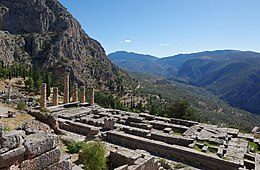| Part of a series on |
| Anthropology of religion |
|---|
 |
| Social and cultural anthropology |
Greek divination is the divination practiced by ancient Greek culture as it is known from ancient Greek literature, supplemented by epigraphic and pictorial evidence. Divination is a traditional set of methods of consulting divinity to obtain prophecies (theopropia) about specific circumstances defined beforehand. As it is a form of compelling divinity to reveal its will by the application of method, it is, and has been since classical times, considered a type of magic. Cicero condemns it as superstition.[1] It depends on a presumed "sympathy" (Greek sumpatheia) between the mantic event and the real circumstance, which he denies as contrary to the laws of nature.[2] If there were any sympathy, and the diviner could discover it, then "men may approach very near to the power of gods."[3]
The Greek word for a diviner is mantis (pl. manteis), generally translated as "prophet" or "seer".[4] A mantis is to be distinguished from a hiereus, "priest," or hiereia, "priestess," by the participation of the latter in the traditional religion of the city-state. Manteis, on the other hand, were "unlicensed religious specialists," who were "expert in the art of divination."[5] The first known mantis in Greek literature is Calchas, the mantis of the first scenes of the Iliad. His mantosune, or "art of divination" (Cicero's mantike, which he translates into Latin as divinatio), endowed him with knowledge of past, present, and future, which he got from Apollo (Iliad A 68–72). He was the army's official mantis. Armies of classical times seldom undertook any major operation without one, usually several. Mantosune in the army was a risky business. Prophets who erred were at best dismissed. The penalty for being a fraud was usually more severe.
- ^ Belief in divination did not die easily. On the whole the Greek writers defended it based on a "trust the gods" argument. Aristotle turned against it and with him Romans of the late Republic. For a summary of the arguments, refer to Raphals 2013, pp. 356–364. The emperors, who would brook no criticism, especially none claiming to be divine (they claimed to be gods themselves), made divination a dangerous occupation on a large scale. The advent of imperial Christianity sealed its fate. Christianity regards divination as the work of the devil, along with witchcraft.
- ^ Cicero. "Divination". Perseus Digital Library. Book II, Chapter 69.
- ^ Cicero. "Divination". Perseus Digital Library. Book I, Chapter 1.
- ^ One who knows the divine will. The root is the same as for English "mind:" "Appendix I: Indo-European Roots". *men-1. The American Heritage Dictionary (Fourth ed.). Boston; New York: Houghton Mifflin Harcourt. 2009.. Compare English "mindful."
- ^ Flower, Michael A. (2015). "Chapter 20, Religious Experience: Unlicensed Religious Specialists". In Eidinow, Esther; Kindt, Julia (eds.). The Oxford Handbook of Ancient Greek Religion. Oxford, UK: Oxford University Press. ISBN 9780191058080.